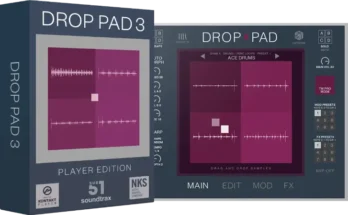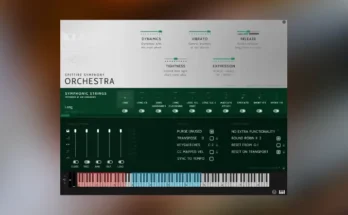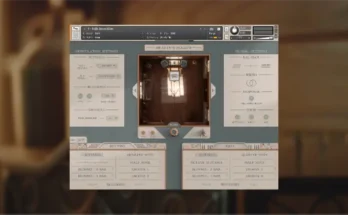CineStrings CORE v1.3.2 KONTAKT
P2P | 11 June 2021 | 4.24 GB
CineStrings CORE is revolutionary in its strength and simplicity to recreate the sound of an orchestral string section. The library was developed by composers, for composers, with direct feedback from the filmmakers community during its development. The result is a string library that is easy to use, composer friendly, and delivers unprecedented recording quality.
CineStrings CORE v1.3 contains a variety of improvements. It has been rebuilt from the ground up to include the Cinesamples Adaptive Legato Engine featured in CineStrings SOLO and CineWinds CORE and PRO. It also features a new Mapping page, improved voice count for better CPU performance, and a number of bug fixes.
The new Mapping Tab offers the same level of flexibility as CineStrings SOLO and includes the option to link dynamics and vibrato. As dynamics increase, so does the vibrato level.
The Settings Tab offers full dynamic range control. Velocity can control the attack time.
The hairpin creator can link vibrato and crescendo.
Additional Information:
Recorded at the world famous SONY Pictures Scoring Stage in Los Angeles, and mixed by veteran legend Dennis Sands, the CineStrings CORE Library covers the essentials of the orchestral string section, and functions as a foundation in any scoring pallette. The result is a string library that is easy to use, composer-friendly, with unparalleled recording quality.
CineStrings library does not require you to purchase any additional sample playback software, and is licensed to work with the Native Instrument’s free Kontakt Player. All you need is a sequencer like Logic, Cubase, Digital Performer, LIVE, Pro Tools, Cakewalk, or even Apple GarageBand and you’ll be up and running. You can also use CineStrings with your favorite notation software such as Sibelius or Finale.
INTUITIVE GRAPHICAL INTERFACE
Cinestrings CORE (as with our other “Cine” series libraries) has a very intuitive and easy to use graphical interface with quickly selectable presets that can help you write, program and mix tailored to your specific practices. The mapping page can quickly set you up for velocity, key-switching or even midi continuous controller (CC) articulation switching. Our mixer page allows you to quickly access our full mix or the four other microphone positions. The settings page allows for advanced control over each of these patches for sound design, programming and other useful features.
The CineStrings CORE library contains the basic set of articulations needed to do most of the traditional writing and programming for the string section.
– Non-vibrato, vibrato and espressivo sustains with smooth dynamic morphing across five dynamics and across each vibrato position
– Natural legatos with smooth dynamic morphing across four dynamics
– Spiccato @ 7-8xRR @ pp to f
– Staccato @ 5-6xRR @ pp to fff
– Marcato @ 3xRR @ p to ff
– Sforzando Overlay @ p to ff
– Tremolos @ p to f
– Sul-Pont Tremolos @ p to f
– Trills (Whole-Step and Half-Step) @ p to f
– Pizzicato @ 5xRR @ p to f
– Bartok Pizz @ 3xRR
– Col Legno @ 3-5xRR
– Harmonic Sustains @ p to f
UNIQUE FEATURES
Our newest feature is the “Hairpin Creator”. This amazing setting allows for you to automatically get very natural “swells” without having to program a series of controller changes. Based on time or synced to your DAW, the strings can crescendo and decrescendo as you play, including linking a non-vib to espressivo state – this allows for amazing and expressive playing without having to touch any other controller!
When we released the CineBrass library we added a feature called “staccato overlay” – we have taken this in a new MAJOR direction with our new bow-attack overlay in CineStrings CORE. You can quickly switch types of overlay (Marcato, Sforzando, etc) through a CC, which then is “over-layed” on the sustains and legatos each time you play at a hard velocity. This allows you to simulate many different styles of bow attacks and create unique playing styles on the fly and recall easily in your DAW.
Along with these features, expect a great deal of expansive programability with our interface. You can link the vibrato and dynamic controls, crossfade the tremolos and sul ponts, create your own unique mix, even add in the Sony “Room Tone” and much more!
ABOUT THE PATCHES
We have included 4 main patches per instrument section. Our basic Articulation patch includes Spiccato, Staccato, Legato, Sustains (with 3 vibrato settings), Tremolos (including sul pont), and both half-step and whole-step trills. Our second patch is called True Legato, which is derived from our articulation patch. Pizzicato and Col Legno are in our third patch, followed by Harmonics in our last patch.
What is True Legato? True legato means that we sampled all of the intervalic leaps throughout the ranges, both upwards and downwards, for each string section. When you play a True Legato patch, it instantly analyses the intervals you play, then plays the appropriate transitional leap between the notes. The result is a smooth and realistic legato performance. For most of our sections we did this at 4 dynamic levels, again using our dynamic morphing to blend seamlessly from pianissimo to fortissimo. A key feature of our legato patch allows you to switch between Mono and Polyphonic Legato mode. Monophonic mode allows for “soli” line playing while Polyphonic mode allows you to play lines of up to 3 notes simultaneously, while maintaining the appropriate transition samples between all notes. This is especially effective when playing chords that need to connect in a realistic way.
Split Patches: We have included every articulation (Half-Step Trill, Sforzando, Col Legno, Spiccato, etc.) as patch splits which are derived from the articulation patch and pizzicato and col legno patch per instrument. This allows you to save memory space if you only need Spiccato and a Sustain patch. While this may increase your track list, many composers choose to have a lot of patches loaded and switch via track instead of keyswitch or velocity.
MULTIS: We are including a series of “unison” and “octave” Kontakt multis which have been pre-set to allow for quick “big” patch performance without having to track split and transpose. These are made from the original patch lists with some minor adjustments to the script to allow for the octave splitting.
The Ensemble:
16 – 1st Violin
12 – 2nd Violin
10 – Viola
10 – Cello
7 – Contrabass
— — — — — MINIFIED INFO — — — — — — —
Since I like to have many Kontakt libraries but don’t want to fill my hard drives with them, I minify them, keeping only what I really need from them.
— Library size is 4.7GB (from ~ 44.9GB)
— All samples are 16bit
— Only the “Close” mic exists
Please REPORT in Comment Broken Links




